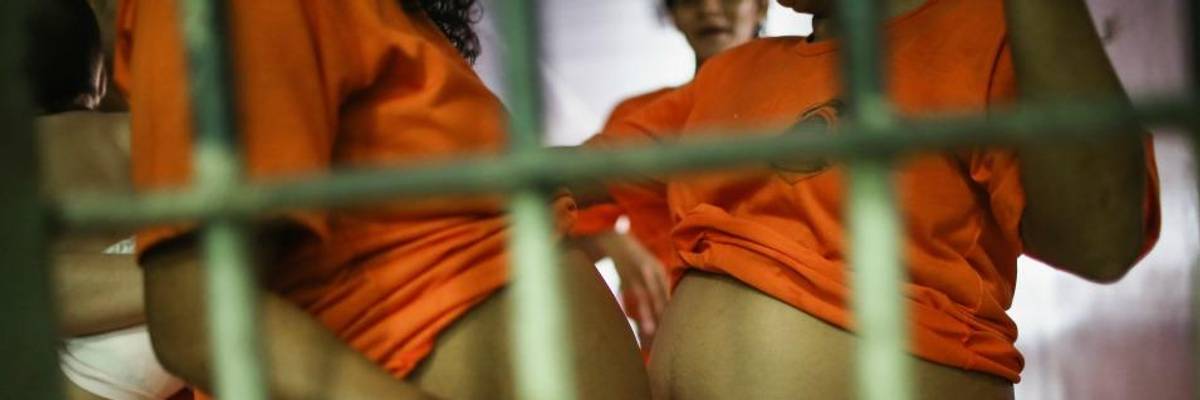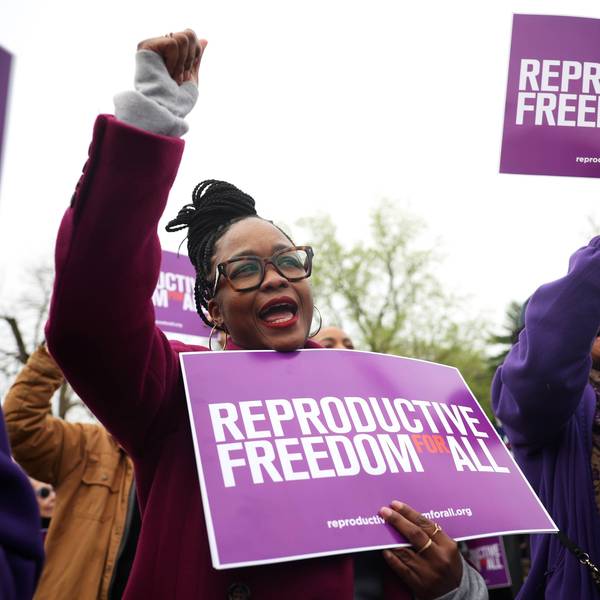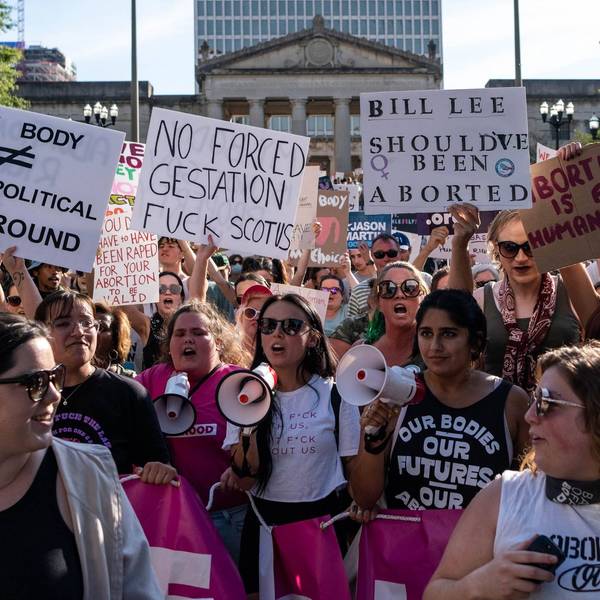
Eight states have no laws or restrictions preventing corrections officers from shackling inmates while they are giving birth. (Photo: Mario Tama/Getty Images)
N.C. Prisons End Shackling of Women During Childbirth, A 'Barbaric' Practice 32 Other States Still Allow
"People's human rights do not end when they enter the walls of a prison."
Ending a practice described by medical experts as "barbaric," the director of North Carolina's state prisons said Wednesday that women who give birth while they are incarcerated will no longer be restrained or shackled during labor.
Women's rights advocates applauded the decision, but expressed anger and dismay that North Carolina is now one of just 18 states that specifically bars prison employees from shackling female inmates during childbirth.
"Shackling people during and after childbirth is both cruel and unsafe...This is a matter of life and death for a laboring individual and their child in these situations," said Monica Simpson, executive director of SisterSong, which led the recent fight in North Carolina to end shackling. "Advocates will continue to work to ensure the strongest version of the policy moves forward and to push for training of staff, so that the policies are consistently enforced."
In the state, women will no longer be shackled after the onset of labor contractions, during delivery, and immediately following birth. Wrist, waist, and leg restraints will be removed after she is transported to a hospital to give birth, "unless there are reasonable grounds to believe the offender presents an immediate, serious threat of hurting herself, staff, or others" or if she presents "an immediate, credible risk of escape," according to the News & Observer.
"I am unaware of any cases of women or girls in labor attempting to escape," Amy Fettig, deputy director of the ACLU national prison project, told the Guardian. "Corrections officials often use this crazy scenario as a justification for chaining women prisoners during childbirth--but it simply doesn't hold water."
Eight states--Utah, Kansas, Nebraska, South Carolina, Indiana, Maryland, Georgia, and Maine--have no laws in place to prevent the shackling of women in labor. Several other states place some restrictions on the practice, but not outright bans. In 2015, the Correctional Association of New York found 23 out of 27 surveyed women who gave birth while incarcerated in the state were shackled, despite a 2009 ban.
"The use of shackles to restrain a pregnant woman during the birthing process is a barbaric practice that needlessly inflicts excruciating pain and humiliation," wrote the American Medical Association in 2010.
Simpson stressed the need to enact wide-reaching reforms to the criminal justice system.
"In the meantime, we can try to mitigate pain and suffering by pushing for changes that can help to provide more dignity and care to people who are incarcerated," she said. "People's human rights do not end when they enter the walls of a prison. We will continue to work to ensure the humanity of every individual."
An Urgent Message From Our Co-Founder
Dear Common Dreams reader, The U.S. is on a fast track to authoritarianism like nothing I've ever seen. Meanwhile, corporate news outlets are utterly capitulating to Trump, twisting their coverage to avoid drawing his ire while lining up to stuff cash in his pockets. That's why I believe that Common Dreams is doing the best and most consequential reporting that we've ever done. Our small but mighty team is a progressive reporting powerhouse, covering the news every day that the corporate media never will. Our mission has always been simple: To inform. To inspire. And to ignite change for the common good. Now here's the key piece that I want all our readers to understand: None of this would be possible without your financial support. That's not just some fundraising cliche. It's the absolute and literal truth. We don't accept corporate advertising and never will. We don't have a paywall because we don't think people should be blocked from critical news based on their ability to pay. Everything we do is funded by the donations of readers like you. Will you donate now to help power the nonprofit, independent reporting of Common Dreams? Thank you for being a vital member of our community. Together, we can keep independent journalism alive when it’s needed most. - Craig Brown, Co-founder |
Ending a practice described by medical experts as "barbaric," the director of North Carolina's state prisons said Wednesday that women who give birth while they are incarcerated will no longer be restrained or shackled during labor.
Women's rights advocates applauded the decision, but expressed anger and dismay that North Carolina is now one of just 18 states that specifically bars prison employees from shackling female inmates during childbirth.
"Shackling people during and after childbirth is both cruel and unsafe...This is a matter of life and death for a laboring individual and their child in these situations," said Monica Simpson, executive director of SisterSong, which led the recent fight in North Carolina to end shackling. "Advocates will continue to work to ensure the strongest version of the policy moves forward and to push for training of staff, so that the policies are consistently enforced."
In the state, women will no longer be shackled after the onset of labor contractions, during delivery, and immediately following birth. Wrist, waist, and leg restraints will be removed after she is transported to a hospital to give birth, "unless there are reasonable grounds to believe the offender presents an immediate, serious threat of hurting herself, staff, or others" or if she presents "an immediate, credible risk of escape," according to the News & Observer.
"I am unaware of any cases of women or girls in labor attempting to escape," Amy Fettig, deputy director of the ACLU national prison project, told the Guardian. "Corrections officials often use this crazy scenario as a justification for chaining women prisoners during childbirth--but it simply doesn't hold water."
Eight states--Utah, Kansas, Nebraska, South Carolina, Indiana, Maryland, Georgia, and Maine--have no laws in place to prevent the shackling of women in labor. Several other states place some restrictions on the practice, but not outright bans. In 2015, the Correctional Association of New York found 23 out of 27 surveyed women who gave birth while incarcerated in the state were shackled, despite a 2009 ban.
"The use of shackles to restrain a pregnant woman during the birthing process is a barbaric practice that needlessly inflicts excruciating pain and humiliation," wrote the American Medical Association in 2010.
Simpson stressed the need to enact wide-reaching reforms to the criminal justice system.
"In the meantime, we can try to mitigate pain and suffering by pushing for changes that can help to provide more dignity and care to people who are incarcerated," she said. "People's human rights do not end when they enter the walls of a prison. We will continue to work to ensure the humanity of every individual."
Ending a practice described by medical experts as "barbaric," the director of North Carolina's state prisons said Wednesday that women who give birth while they are incarcerated will no longer be restrained or shackled during labor.
Women's rights advocates applauded the decision, but expressed anger and dismay that North Carolina is now one of just 18 states that specifically bars prison employees from shackling female inmates during childbirth.
"Shackling people during and after childbirth is both cruel and unsafe...This is a matter of life and death for a laboring individual and their child in these situations," said Monica Simpson, executive director of SisterSong, which led the recent fight in North Carolina to end shackling. "Advocates will continue to work to ensure the strongest version of the policy moves forward and to push for training of staff, so that the policies are consistently enforced."
In the state, women will no longer be shackled after the onset of labor contractions, during delivery, and immediately following birth. Wrist, waist, and leg restraints will be removed after she is transported to a hospital to give birth, "unless there are reasonable grounds to believe the offender presents an immediate, serious threat of hurting herself, staff, or others" or if she presents "an immediate, credible risk of escape," according to the News & Observer.
"I am unaware of any cases of women or girls in labor attempting to escape," Amy Fettig, deputy director of the ACLU national prison project, told the Guardian. "Corrections officials often use this crazy scenario as a justification for chaining women prisoners during childbirth--but it simply doesn't hold water."
Eight states--Utah, Kansas, Nebraska, South Carolina, Indiana, Maryland, Georgia, and Maine--have no laws in place to prevent the shackling of women in labor. Several other states place some restrictions on the practice, but not outright bans. In 2015, the Correctional Association of New York found 23 out of 27 surveyed women who gave birth while incarcerated in the state were shackled, despite a 2009 ban.
"The use of shackles to restrain a pregnant woman during the birthing process is a barbaric practice that needlessly inflicts excruciating pain and humiliation," wrote the American Medical Association in 2010.
Simpson stressed the need to enact wide-reaching reforms to the criminal justice system.
"In the meantime, we can try to mitigate pain and suffering by pushing for changes that can help to provide more dignity and care to people who are incarcerated," she said. "People's human rights do not end when they enter the walls of a prison. We will continue to work to ensure the humanity of every individual."

